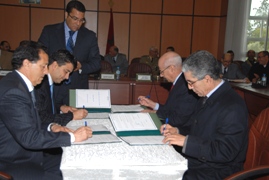Khemisset : Signature of Convention to Implement Community Reparation Projects
Within the framework of the implementation of the recommendations of the Equity and Reconciliation Commission (IER), particularly as regards the community reparation program, the Advisory Council on Human Rights (CCDH) signed a partnership agreement with the Ministry of Interior and the CDG, a financial group in charge of the implementation of the program, at the headquarters of the province of Khemissat, on March 4, 2009.
The signing ceremony was attended by the CCDH President, Mr. Ahmed Herzenni, Governor of the Province of Khemisset, the representative of the CDG, the President of the Provincial Council of Khemisset, the presidents of the local communes concerned, associations members in the local coordination body of the community reparation program in Khemisset and some victims of past gross violations of human rights.
Mr. Herzenni said that the regions of Khemisset, Azilal, and Tan-Tan were not covered by the first agreement signed with the European Union, which involved the provinces of Ouarzazate, Errachidia, Zagora, Figuig, Nador, Al Hoceima, Casablanca (Hay Mohmmad) and Khenifra. Therefore, it was decided to conclude this convention with a view to filling this gap and integrate these regions in the original program.
Under this convention, the CCDH undertakes to mobilize financial and human resources locally, nationally and internationally, draw up studies, submit proposals likely to ensure reparation for the province, collect data and information, prepare reports on the execution of the community reparation program; while the provincial council is committed to providing funding. For its part, the CDG undertakes to monitor the implementation of the program, manage the budget made available to implement the program, and open an account for the program.
It should be noted that the CCDH had established local coordination bodies to ensure the monitoring of the community reparation program in the 11 regions that suffered from violations of human rights between 1956 and 1999. This program aims to enhance the capacity of local actors, preserve the positive memory, improve the living conditions of local communities, empower women and people with special needs.






















